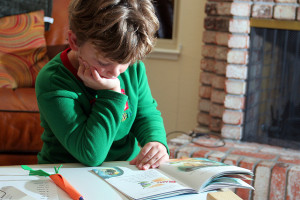
Photo Credit: John Morgan
Dyslexia is a specific Learning Disability believed to have a neurological and genetic basis. It is frequently associated with phonological processing, which may contribute to problems with spelling, writing, and speech. Children who have difficulty with recognizing words, decoding, fluency, and comprehension may suffer from dyslexia.
It is typical that most children will produce reversals of letters, numbers, and words as part of the developmental process, and this does not mean that they have dyslexia. A difficulty is diagnosed as dyslexia only when a child struggles with reading in spite of average to above-average intelligence.
Children who are dyslexic or struggling readers may avoid doing homework schoolwork, and possibly school itself. They may have problems managing time effectively and show an unwillingness to participate in their learning. Additional behavior and social issues can also emerge that impact self-esteem and peer relationships.
Reading difficulties have an enormous impact on a child’s performance in school, as almost all academic subjects require reading and writing skills. Children who have problems with paying attention, being bored, or avoiding schoolwork may actually have significant difficulties in reading. They might find it hard to get started on tasks due to problems in following directions or a lack of confidence in their ability to complete tasks effectively. They may find it difficult to remember directions and sustain their effort in tasks that they feel to be overwhelming. Some children might read very slowly, often with the result of falling behind their peers in completing class work and homework. This can make it difficult for these children to learn in other content areas where they have great interest, such as science or history.
Recommendations
1. Consult with a psychologist if you notice any of the following apply to your child :
- has problems getting started on tasks because of not understanding the directions
- has ongoing difficulty with reading in spite of seeming otherwise intelligent
- avoids school and/or schoolwork, especially reading and writing assignments
- shows problems paying attention
- frequently misspells words, sometimes reversing the letter “b” for “d” or “p”
- lacks confidence in the ability to complete tasks
- is unable to recognize short vowel sounds
- struggles to match a letter with its sound
2. Use programs that highlight phonological processing (e.g., Orton-Gillingham and the Wilson Reading System). These programs have been found to be beneficial in teaching children with reading disabilities how to read. Ensure that your child’s resource teacher has been trained in this methodology.
3. Ask the teacher if your child may use a laptop computer or an AlphaSmart to help with classroom work. This may be particularly helpful for children who also struggle with handwriting.
4. Learn how to activate a voice-recognition system such as Dragon Naturally Speaking. This program allows your child to dictate, and his or her oral output is translated into written language. Encourage your child to learn how to use this for prose by having them read paragraphs (including all punctuation) into it.
5. Ask your child’s teacher to provide them with practice in developing fluency in reading comprehension through small-group reading programs. Some children with disabilities in this area qualify for an Individual Education Plan (IEP) and/or group lessons by a specialist within the school setting
6. Draw upon all learning (visual, auditory, tactile, kinesthetic) modalities when presenting information. A child who does not respond to pictures may benefit from hands-on activities such as tracing sandpaper as an aid for reading.
7. Make reading fun. Children with reading difficulties need to put in more time and effort when reading than their peers. Offer reading material that is of particular interest (such as magazines) and engaging software programs.
8. Allow your child to use resources online. This can make reading more fun and engaging, along with improve their reading skills. One such site is Scholastic.com.
Websites
Learning Works for Kids: The premier site for executive-function information, this site provides a wealth of up-to-date tips and recommendations for children with all types of disorders and disabilities.
Kids Health: This site contains general information regarding dyslexia, including how it is diagnosed, its effects, and treatment.
The International Dyslexia Association: This site has a good question-and-answer section and a list of articles regarding dyslexia.
Reading Rockets: This site offers suggestions and strategies to help parents teach their child with dyslexia how to read.
Reading Is Fundamental: This site offers activities to help children with dyslexia improve their reading skills.
LD OnLine: This site is an extensive resource for learning disabilities and ADHD information, with interactive features and unique content.
Books
Hall, Susan and Louisa Moats. (2002). Parenting a Struggling Reader. New York, NY: Random House Publishing.
Marshall, Abigail. (2004). The Everything Parent’s Guide to Children with Dyslexia. Cincinnati, OH: Adams Media.
Shaywitz, Sally. (2002). Overcoming Dyslexia: A New and Complete Science-based Program for Reading Problems at any Level. New York, NY: Random House Publishing.
Silver, Larry. (1998). The Misunderstood Child: Understanding and Coping with Your Child’s Learning Disabilities. New York, NY: Random House Publishing.
Stowe, Cynthia. (2000). How to Reach and Teach Children and Teens with Dyslexia: A Parent and Teacher Guide to Helping Students of All Ages Academically, Socially, and Emotionally. San Francisco, CA: Jossey-Bass Publishers.
West, Thomas G. (1997). In the Mind’s Eye : Visual Thinkers, Gifted People with Dyslexia and Other Learning Difficulties, Computer Images and the Ironies of Creativity. Amherst, NY: Prometheus Books.
Receive online class information and helpful tips from Dr. Randy Kulman's LearningWorks for Kids |



